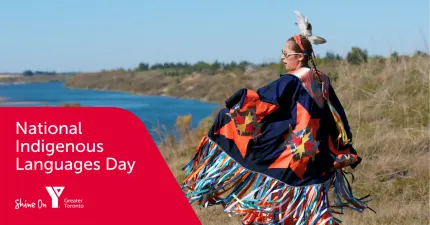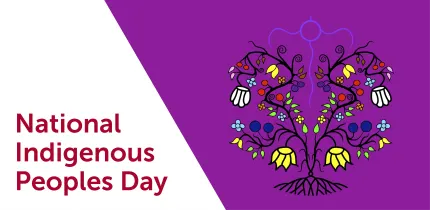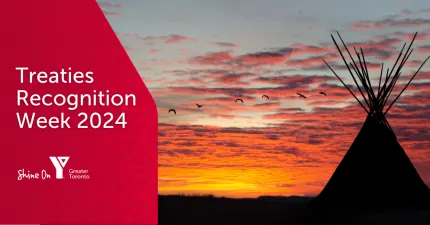
Anti-Colonialism & Indigenous Reconciliation
Our continued focus on addressing systemic discrimination and barriers with Indigenous Peoples includes creating learning opportunities about the legacy of colonization and its impact on Indigenous communities to better serve everyone who is part of our YMCA.
Land Acknowledgement
The YMCA of Greater Toronto is committed to establishing relationships, nourishing existing partnerships with Indigenous community members, and upholding our responsibilities on the journey to reconciliation. We acknowledge the Sewatokwa:tshera't (Dish With One Spoon) Treaty and that the YMCA of Greater Toronto occupies land currently known as Toronto, which the Williams Treaties and Treaty 13 cover. The YMCA of Greater Toronto recognizes the thoughtful care of these ancestral territories and is grateful for the guidance of the land’s ancestral caretakers, the Anishinaabe Nations: the Mississaugas, the Potawatomi, the Odawa, the Ojibwe/Chippewa, the Algonquin, the Nbiising, and the Saulteaux, along with Haudenosaunee and the Huron-Wendat, who have been the land’s ancestral caretakers and continue to protect and care for the lands that the YMCA of Greater Toronto occupies. The YMCA of Greater Toronto also resides outside of the Greater Toronto Area for a number of operational needs on the lands on the Wahta Mohawk and the Petun/Tionontati
Our Goals
- To contribute to anti-colonial processes that enhance reconciliation efforts
- To strengthen and build meaningful relationships with Indigenous communities, with attention to intersecting identities, to ensure that the Y is a trustworthy partner
The Y’s work will be tangible, including behavioural changes, programmatic shifts and systemic rebuilds that recognize the importance of Indigenous Peoples, cultures, and communities to achieving the goals in this focus area. We understand that we must approach this work with Indigenous Peoples every step of the way. Anti-colonialism is important in approaching work to advance Indigenous inclusion, rights, and sovereignty, and it offers a framework for every area across the Y to challenge existing structures and systems not specifically related to this focus area. We will seek ways to apply this framework across our charity.
Responding to the Calls to Action of the Truth and Reconciliation Commission’s in areas connected to our work is integral to our success in this area. We recognize the importance of land and sovereignty in anti-colonialism work. We have opportunities to revisit land allocation and space usage in relation to Indigenous Peoples, honouring our commitment to Truth and Reconciliation.
Indigenous-focused Programs and Initiatives
Since the launch of the DEIB Strategy in 2022, the YMCA has implemented many exciting and innovative Indigenous-focused programs and initiatives. Below are some examples:
Employee-focused/internal Initiatives
- In 2022, we created a new role, Manager of Indigenous Relationships, to guide and support the work under the Anti-Colonialism and Indigenous Reconciliation focus area.
- All employees must complete a course created by First Nations University to learn about the history and current experiences of Indigenous Peoples and our responsibilities in alignment with the Truth and Reconciliation Commission's 94 Calls to Action.
- All employees have access to the Land Acknowledgement Bundle, which includes a land acknowledgement guide to support employees in creating personalized land acknowledgements.
Community-focused initiatives
- In 2023, YMCA Camp Pine Crest and Wahta Mohawk First Nation collaboratively developed and offered free camping and outdoor education programming. Efforts to strengthen the relationship between Camp Pine Crest and the Wahta Mohawk First Nation community are ongoing.
- In 2023, a medicine garden was created at YMCA Cedar Glen Outdoor Centre for the Giwaabamin Free Street Clinic. This Indigenous grassroots organization provides a free clinic from a harm reduction position, serving unhoused individuals in the city of Toronto. The Cedar Glen farmer tends to and harvests the traditional Indigenous medicine garden’s crops.
- In June 2023, YMCA Cedar Glen provided free access to their space for an Indigenous Language Camp run by the ENAGB Indigenous Youth Agency.
Programs and Initiatives in Partnership With Indigenous-Led Organizations
- Partnership with ENAGB Indigenous Youth Agency:
- The YMCA and ENAGB Indigenous Youth Agency achieved the following outcome together:
- Provide free gym memberships for ENAGB youth members at The Steve and Sally Stavro Family YMCA
- Offer free CPR, Babysitting, and Bronze Cross training to ENAGB youth members
- ENAGB named The Steve and Sally Stavro Family YMCA’s gymnasium Mino Maadziiying, an Anishinaabemowin name that means living a healthy life
- In June 2023, YMCA Cedar Glen provided free access to their space for an Indigenous Language Camp run by the ENAGB Indigenous Youth Agency
- Partnership with Okichitaw Indigenous Combat Arts:
- YMCA Health and Fitness locations are working with George Lepine, founder and head of Okichitaw Indigenous Combat Arts, to offer Okichitaw workshops through the YMCA Karate programs. The workshops include the history of Indigenous combat arts, why they are important, and practical experiences with technique and equipment.
Employee and Community Groups that Support Our Truth and Reconciliation Efforts
Indigenous Advisory Circle
An Indigenous Advisory Circle supports our Camping and Outdoor Education department. They provide consultation on proposed Indigenous focused programs and initiatives. This advisory circle reflects the importance of Indigenous inclusion in our strategic planning and program designs.
Indigenous Reconciliation Working Group
In 2018, we formed the Employee Resource Group to advance truth and reconciliation work at the Y. The members of this group are Indigenous employees and allies committed to advocating, organizing, and providing consultation for initiatives that remove barriers and support the advancement of Indigenous employees, volunteers, and members. In the section below, you’ll find some impactful archived messages sent by the working group.
A Canada Day Message
The Indian Residential School Survivors Society is available to survivors and their families: 1-800-721-0066 and 1-866-925-4419 for the 24-7 crisis line.
While July 1st is a time of celebration and rest for many, the YMCA and our Indigenous Reconciliation Working Group recognize how challenging this year has been for many in the YMCA community and across Turtle Island. Today is a time to pause and reflect on where we have been and where we want to be as a country. Please join us in doing so. This could include reading or reacquainting yourself with the Truth and Reconciliation Commission’s Calls to Action (PDF).
In recent months and weeks, we have witnessed the recovery of the remains of 215 Indigenous children on the grounds of the Kamloops Residential School, 104 remains at the former site of the Brandon Residential School, 35 remains on the Muskowekwan Residential School, 751 remains at the former site of the Marieval Indian Residential School at Cowessess, Saskatchewan, and 182 remains at a site near Cranbrook, British Columbia, close to the former site of St. Eugene's Mission School. We know many more recoveries are to come.
As one of Canada’s largest service charities, the YMCA has a role in fostering truth and reconciliation with Indigenous communities. We are committed to doing our part. We acknowledge this and understand we still have a lot of work to do. We will continue to focus on addressing systemic discrimination and barriers with Indigenous Peoples. This includes creating learning opportunities with Indigenous partners for staff and volunteers about the legacy of colonization and its impact on Indigenous communities, so we can better serve everyone who is part of our YMCA.
On Thursday, May 27, 2021, news broke that 215 bodies of Indigenous children, some as young as three, were found via ground-penetrating radar on the grounds of Kamloops Indian Residential School in British Columbia. This discovery has sparked national grief, outrage, and anger. While this is news for many Canadians, this unthinkable loss was spoken about for years within impacted communities but never truthfully documented or acknowledged by the Residential School.
Please read the statement (PDF) released from the Office of the Chief from Tk’emlúps te Secwépemc First Nation. This statement includes context about the missing children and background information on this Indian Residential School (IRS).
These are not historical occurrences. Indigenous communities continue to deal with the effects of residential schools and the terrible consequences of colonialism. The last school closed in 1996 in Saskatchewan. Here in Ontario, 18 schools operated. Last week’s discovery of 215 children means that 430 parents were impacted. And 860 grandparents. Immeasurable relations lost; memories, legacies, stories – silenced and hidden until now. The trauma of this cultural genocide is real, and healing continues to take place today. Each announcement reopens that wound.
According to the Truth and Reconciliation Commission (TRC), large numbers of children who were sent to residential schools never returned to their home communities. Some ran away, while others died at the schools. The exact number of children who died at school may never be known, but the death rates for many schools, particularly during times of epidemic or disease, were very high. Between 1941 and 1945, residential school students were dying at a rate almost five times higher than the general death rate. Even by the 1960s, Indigenous students at the schools were dying at double the rate of the general school-aged population.
Some parents never found out what happened to their children. The children who did not return are known as the Missing Children. Working with Survivors and Indigenous organizations, the Missing Children Project is documenting the deaths and the burial places of children who died while attending the schools. To date, the TRC has identified the names of, or information about, more than 4,100 children who died of disease or accident while attending a residential school.
Tristen Durocher, Métis musician and advocate for suicide prevention and mental health programs, states: "If Canada lowered its flags one day for each child who died in a residential school, our flag would not rise for 11 years." How do we reckon with this? After the flags are raised from half-mast and the shoes placed in memoriam are removed, what do we do next?
In the face of such tragedy, one may be overwhelmed. While it will take time to process, settlers on the land now known as Canada all have the moral obligation to read the Truth and Reconciliation Commission's 94 Calls to Action (PDF). These Calls to Action were published in 2015 to acknowledge and set right the legacy of residential schools and to advance the process of Canadian reconciliation. Today, we pay particular attention to actions 71–76, which speak to the work needed to redress IRS missing children and burial information.
Indigenous Peoples continue to be impacted by the legacy of residential schools. The intergenerational trauma experienced by Indigenous communities is immeasurable, and the present-day over-representation of Indigenous children in the child welfare system is evidence of the ongoing, deep-rooted systemic discrimination experienced by Indigenous Peoples.
The YMCA of Greater Toronto’s Indigenous Reconciliation Working Group (IRWG) has committed to listening, learning, and working with Indigenous communities towards reconciliACTION. Recognizing that, for a part of history, we each have a responsibility to know what has happened for us, not to repeat it, and to understand the unique experiences and needs of the diverse communities we serve. For the part of history we are collectively writing today, we have an undeniable responsibility and must act accordingly.
It is with this understanding that we, the IRWG, invite you to act today and:
- Explore, read, share, and reflect on the content of each of the links provided in this statement, all highlighted in red.
- Continue your learning and deepen your understanding about residential schools. For example, visit this link for a series of powerful videos.
- Visit the Woodland Cultural Centre’s website to learn about its campaign to save the Mohawk Institute Indian Residential School and transform it into a space of learning and remembrance. "Take the tour. Understand and go forward with the truth."
- Take it upon yourself to learn more about your place in Canada's history.
Diversity and social inclusion are foundations of the YMCA’s work and align with our vision to create and maintain healthy, welcoming communities for all.
For many years, particular YMCA programs, such as Camping and Outdoor Education, National and Provincial Programs, and Child Family Development, have worked to learn about, learn from, and build relationships with Indigenous communities. This work is ongoing and based on the assessed needs and goals of each program area.
In our 2018–2021 Diversity and Social Inclusion Strategy, several priority areas are named, including supporting First Nations, Métis, and Inuit populations in the GTA. The Y is developing its awareness of the history of Indigenous people in Canada and the changing needs of a rapidly growing urban Indigenous population. We know we have a role in realizing the Calls to Action issued by the Truth and Reconciliation Commission of Canada. As a result, in June 2018, the Indigenous Reconciliation Working Group (IRWG) was formed. It is an internal advisory committee to the YMCA of Greater Toronto comprised of staff from across programs and regions.
In June 2018, the working group produced a report about its formation and activities from June 2018 to September 2020.
More to Explore
National Indigenous Languages Day
National Indigenous Languages Day is an occasion to honour the linguistic heritage of First Nations, Inuit, and Métis across Canada. It reminds us of the importance of Indigenous languages in shaping the culture and identity of Indigenous communities and preserving history.
We are all treaty people: Canadian society and reconciliation
Reflecting on our shared rights, obligations, and responsibilities as treaty people to build a better future for our country. We are all treaty people in Canada, and we can guide our relationships through the teachings and principles of treaty-making.
As one of Canada’s largest service charities, the YMCA has a role to play in fostering truth and reconciliation with Indigenous communities. The YMCA of Greater Toronto is committed to doing our part. We acknowledge this, and understand we still have a lot of work to do. We will continue to focus on addressing systemic discrimination and barriers with Indigenous Peoples. This includes creating learning opportunities with Indigenous partners for staff and volunteers about the legacy of colonization and its impact on Indigenous communities, so that we can better serve everyone who is part of our YMCA.
If you have any questions or want to learn more about the YMCA of Greater Toronto’s anti-colonialism and reconciliation work, please email Indigenous@ymcagta.org.



